
The Indiana lease agreement is a practical document that is achieved when a landlord and tenant would like to enter into a legal arrangement concerning the rental of a property. Usually, upon viewing the property, the party interested in utilizing the residence will be obligated to fulfill a rental application to confirm that they are an acceptable prospect. Once approved, the terms of the contract will need to be discussed to ensure both parties are on the same page. The monthly rental fee, price of the security deposit, and other provisional requirements will need to be stated within the form and accompanied by signatures to guarantee a cohesive agreement.
Rental Application – When qualifying potential tenants, a fillable form can be ideal for getting an account of the information and background of the applying individual. The downloadable document serves to resolve any inquiry on the status of the applicant’s rental history and income eligibility for the rental property.

Commercial Lease Agreement – Manages the exchange of possession in regard to a rental property that is used for the sole purpose of housing a professional business operation.
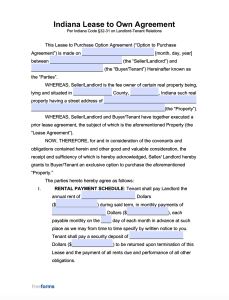
Lease to Own Agreement – Also known as a “lease-purchase contract”, this document allows renters to buy the property they occupy at any time during the course of the agreement.
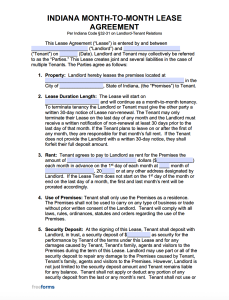
Month-to-Month Lease – Labeled as a “tenancy at will”, this type of express contract permits individuals on both sides of the agreement to cancel the terms of the lease at any given time, so long as there is thirty (30) days’ notice submitted before the document’s expiration date (§ 32-31-1-1).
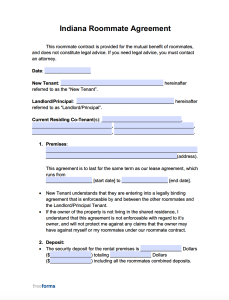
Roommate Agreement – Allows users to define the terms of an arrangement specific to the rental of a room that is located within the confines of a larger property.
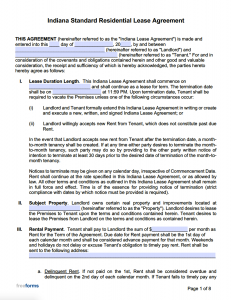
Standard Lease Agreement – Commemorates the execution of a promise to rent a dwelling for an indicated period of time.
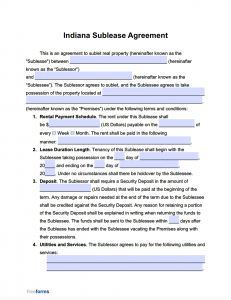
Sublease Agreement – Requires the landlord’s consent to allow the current tenant to “sublet” the property/unit to a secondary tenant (known as subtenant or sublessee).
In order to better understand the inner workings of Indiana’s legislation concerning the rights/responsibilities of lessors and lessees, review Landlord-Tenant Relations (IC 32-31).
The IHCDA (Indiana Housing & Community Development Authority) also offer renters the following informative packets regarding tenants’ rights for Section 42 and HOME properties:
Floodplain ( § 32-31-1-21) – Put into effect for all lease agreements that were created or renewed after June 30, 2009, any rental property that has a bottom floor that is below the one hundred (100) year frequency flood elevation must come with a written disclosure provided by the landlord. (Find out more information by visiting the Indiana Department of Natural Resources’ Floodplain Mapping page.)
Lead-Based Paint (42 U.S. Code § 4852d ) – Specific to the leasing of residential properties constructed before the year 1978, this disclosure must include any known information about the presence of lead-based paint hazards contained within the boundaries of the residence, as well as information explaining the dangers of exposure to the toxic material.
Manager/Agent Contact Details ( § 32-31-3-18) – Upon entering into a rental/lease agreement, the lessor or their legal representative must provide a written disclosure that contains the names and addresses of any managers, proprietors, or authorized agents working on their behalf.
Smoke Alarms ( § 32-31-5-7) – Although this is not technically a landlord disclosure, it is their responsibility to acquire a written statement from the tenant acknowledging that the property is furnished with operable smoke detectors.
Water/Sewage Disposal Service ( § 8-1-2-1.2) – If a landlord bills a tenant for the use of a water or sewage disposal service separately from the amount of the rent payment, they must disclose in writing the pertinent facts regarding the services being provided, a list of all the fees that may be charged, and the attachment of the following statement:
“If you believe you are being charged in violation of this disclosure or if you believe you are being billed in excess of the utility services provided to you as described in this disclosure, you have a right under Indiana law to file a complaint with the Indiana Utility Regulatory Commission. You may contact the Commission at (insert phone number for the tenant to contact the Commission).”
Indiana law does not define a specific due date or grace period in which the tenant has to supply rent to the landlord. This should be arranged within the content of the lease agreement before entering into the contract.
There is no set dollar amount or percentage of the rent payment that is fixed by the state in regard to a late fee. All charges for overdue payments should be predetermined within the rental agreement.
If the tenant of the property supplies the landlord with a check that is linked to an account with insufficient funds, the landlord may provide a notice demanding compensation for the face value of the check and a service fee for any damages that incurred, which shall not exceed $27.50 or 5% of the amount written on the check ( § 35-43-5-5). If the tenant refuses to reimburse the landlord within ten (10) days of receiving the notice, they will be deemed “criminally liable” and can be taken to court. (The landlord may also begin the eviction process if the rent payment is past due.)
Indiana’s law code does not restrict the amount a lessor can charge for the initial cost of a security deposit. (The cost of the security deposit should be listed within the terms of the lease agreement before starting the tenancy.)
The landlord is obligated to deliver the security deposit back to the tenant within the span of forty-five (45) days from the end of the lease’s term. If deductions were necessary for property damage, overdue rent, unpaid utility bills, etc, the landlord must furnish an itemized list of the subtractions along with the remainder of the deposit ( § 32-31-3-12).
Although no specified time is given, Indiana requires that the landlord provide reasonable notice prior to accessing a tenant’s unit/property ( § 32-31-5-6(g)). Notifying the tenant a minimum of 24-hours in advance is typically considered acceptable.